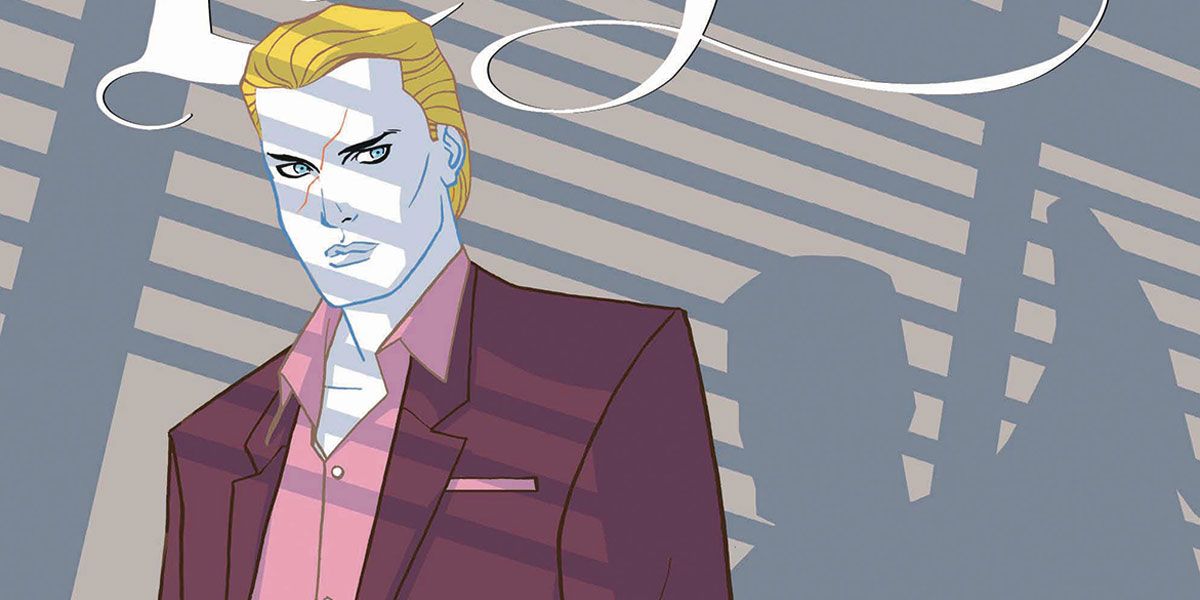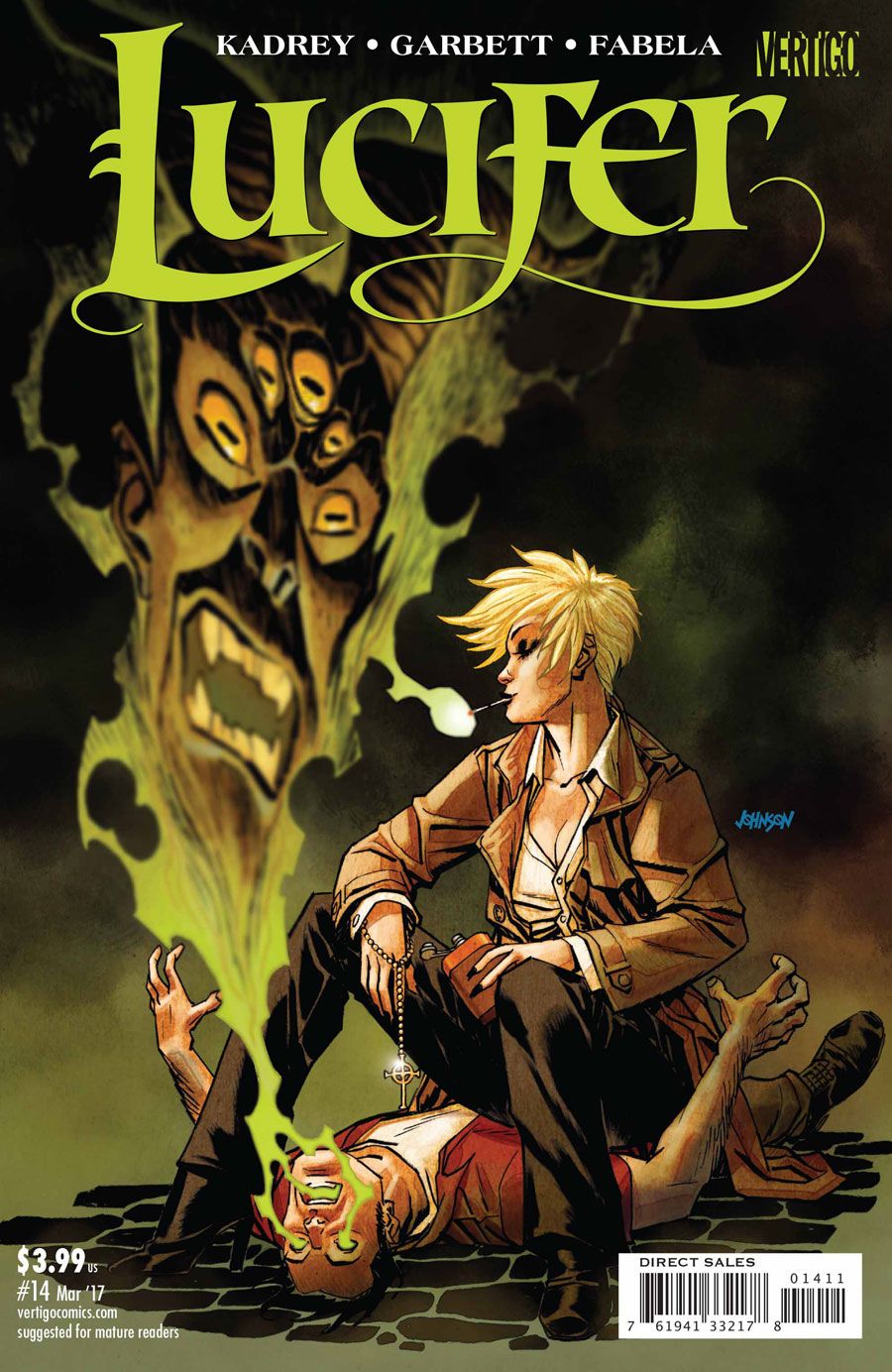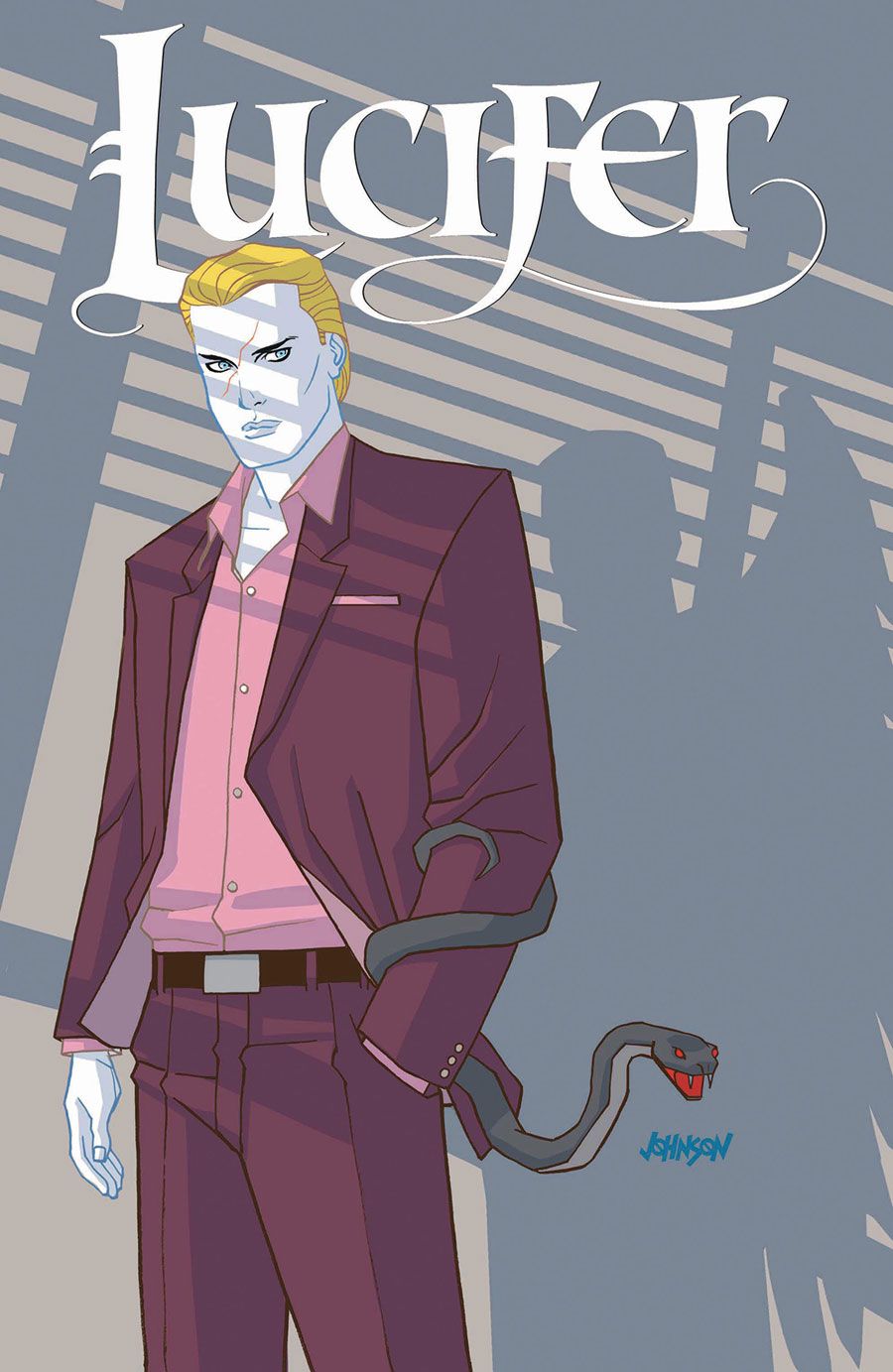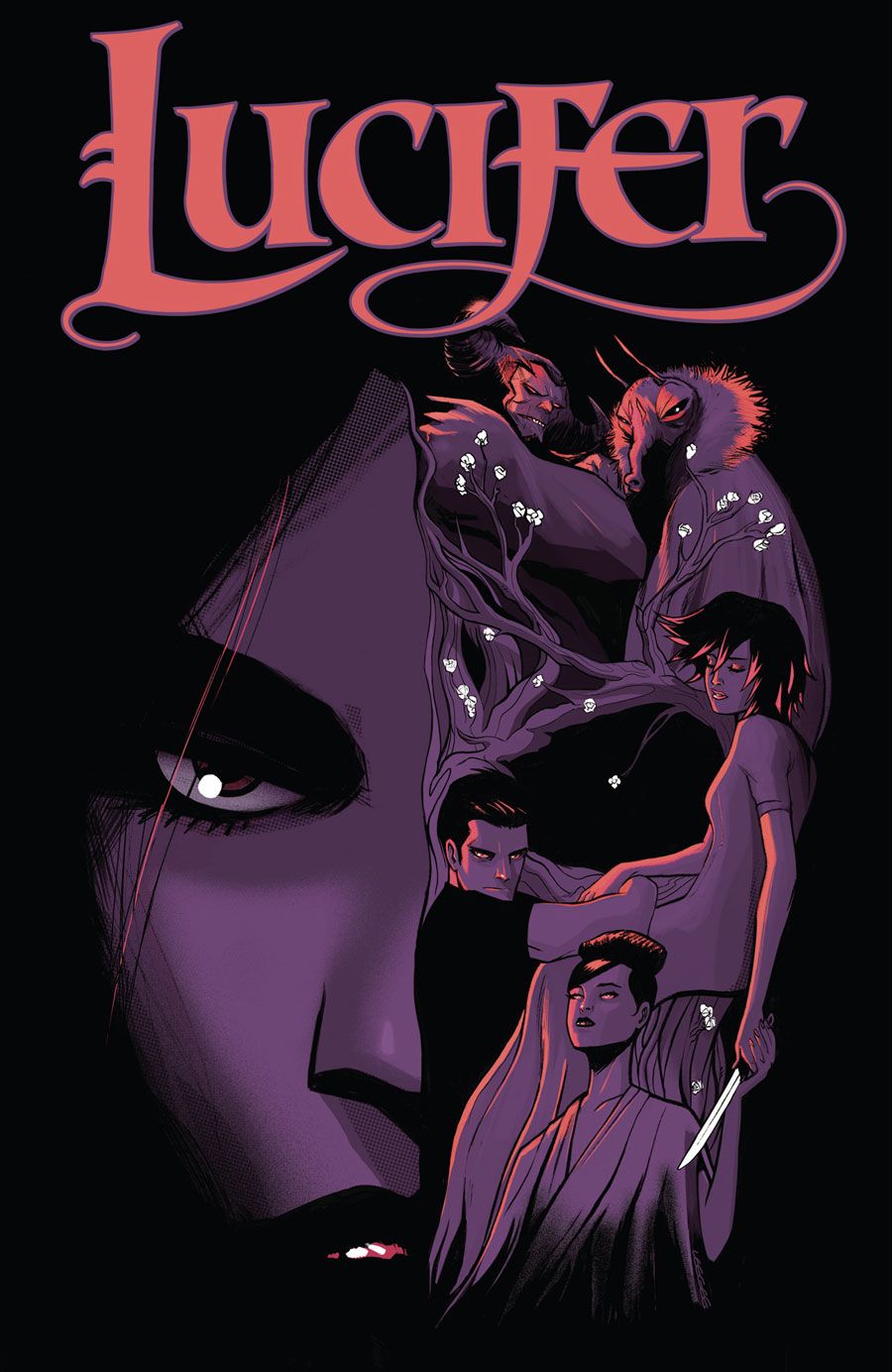The Devil has a whole universe to play in -- Hell, Heaven, Earth and everything in between. But in DC Comics' Vertigo line -- and the Fox TV series inspired by the comic -- Lucifer is far more down to earth, in the most literal way possible. Rather than lording over a vast dimension of pain and fire, he's more likely to be the lord of Lux, his chic piano bar in the material realm.
Urban fantasy novelist Richard Kadrey of the "Sandman Slim" series takes over Vertigo's "Lucifer" starting with this week's issue #14, alongside artist Lee Garbett, who's been on board the book since it relaunched in December 2015. Despite the cosmic and universal scale that the devil could play with, Kadrey is keeping Lucifer grounded in the human world. Specifically, in the City of Angels itself, Los Angeles.
RELATED: Fox’s Lucifer May Add a Classic DC Character
What's more, Kadrey sees Lucifer not as a malevolent or adversarial figure, but as an embodiment of free will, individuality and the opposite of divine authoritarianism. That's not to say that there aren't other demons out there looking to destroy humanity, though, and even God Himself might be a threat to the world as a whole. CBR spoke with Kadrey about what he's got planned for "Lucifer," why he doesn't see the devil as evil and his collaboration with Garbett.
CBR: Richard, without giving too much away, how would you summarize your plans for "Lucifer"?
Richard Kadrey: Well, one of the first things we talked about was really centering Lucifer in Los Angeles, not having him go too far to other realms. Really making him physically and mentally part of the city, and using the city and its inhabitants as part of his storyline. We want to deal with both long-term story elements that have been coming in "Lucifer" from as far back as [original "Lucifer" writer Mike] Carey and certainly from [previous "Lucifer" writer] Holly [Black]'s run, and really put it in a contemporary setting.
It's really hard to talk about some of this without giving it away. We're dealing magic and economics and politics and Lucifer all at the same time.
Lucifer as a pop culture character and Lucifer in DC/Vertigo specifically has been portrayed with a variety of motivations -- wanting to rebel against God, wanting to be left alone and do his own thing, wanting to actively subvert the lives of mortals. What is he about in your run?
I think it's very much along the same lines that Holly's been working on, in that he's come back, and is engaged in the world. He was gone but he very consciously chose to come back, and now that he is back he has to deal with all of the ramifications of having been gone, and having to deal with the world as it is right now. Certainly dealing with the issue of the new God that is looming in Heaven, and what that means for Lucifer, the world, the whole universe.
How do you see his relationship with humans in general?
He's not adversarial. I see him more as amused. He sees us running around trying to get everything right, working so hard at it, and just screwing up all the time. I think he's just a little bit removed and kind of shaking his head and chuckling to himself, but I think he has a certain weird affection for humanity.
What about his relationship with the truth? He's been portrayed as someone who does lie, and he's also been portrayed in DC/Vertigo as someone who always says things that are accurate in the literal sense, but might be deceptive. Which direction do you want to take the Father of Lies in?
I don't see him as a liar, but that does not mean that he's going to give you all of the information that's going to put you at an advantage. He will tell you the truth, and he will tell you enough, and he believes in free will, but you have to do some of the work yourself. And you have to remember, always, that you're dealing with Lucifer. He's not going to flat-out lie to you, but what does the truth mean in this circumstance?
This also might seem like a weird question since we're talking about the literal devil, but do you think he's evil?
No, I've never seen Lucifer as evil. I've written a lot about Lucifer in my book series, "Sandman Slim." I've done a lot of research on Lucifer and I do not see him as evil at all. If you look at the history of Lucifer going back to the Old Testament, Lucifer is not an evil character. He's portrayed as evil later in church teachings basically as a bludgeon against worshippers. He's something to scare people into falling in line.
Let's face it, all of us modern writers who write about Lucifer, we're all stealing from Milton. A lot of this comes out of the image of Lucifer from the first half of "Paradise Lost." Free will is key. Free will is what he's about and that's where his truth comes from. And any of his dealings with humanity come out of that conflict between his desire for free will and God's desire for control.
So you see him more as an avatar of individuality as opposed to the embodiment of evil?
Absolutely. And with all of the messiness that comes with free will. He doesn't get everything right all of the time. He screws up, too.
You're also focusing on several other prominent characters. Who else is running around with Lucifer?
If you've read #14 then you've met Arabelle Crane, and we're definitely going to be seeing more of her. Arabelle's going to be a fun character for people. She's a detective, she's someone who has a lot of powerful magic, and she has a ton of flaws that I think will make her fun and interesting for people. She's very psychologically powerful, too, with an interesting history that you'll see more about very soon.
And then you're going to see some old characters coming back, but I'm not [going] to give stuff away. You're going to see some old people coming back in surprising ways and in surprising forms, transformed a bit. People might have been adversarial are a bit friendlier now that the see what the stakes are.
You've also got Asmodeus and Beelzebub in there. They're very much presented as the villains of the piece, at least from the outset. What do you think distinguishes Lucifer from those other demons, either in temperament, morality, or ways of seeing the world?
I think Lucifer is different in all of those aspects. Those demons in particular are what humanity thinks of as “the devil.” They are villains, they are out for themselves in every single way, and we'll get more into that as the series progresses. They're untrustworthy. Yes, Lucifer is called the Father of Lies, but that applies much more to their ilk.
What are some of your favorite and least favorite portrayals of the the devil, hell, demons, etc. outside of DC/Vertigo?
I think there's a wonderful Lucifer in the movie “Constantine.” He's fascinating, funny, and he's completely mad. He's a bit more like the old-school Lucifer, like the crazy evil one, but he's portrayed so wonderfully in that role. He has a sense of humor and a sense of real danger. He's such a fun character.
On the other hand, you have Al Pacino in “The Devil's Advocate,” which, to me, is probably the worst portrayal of Lucifer. Certainly in his Luciferian form. He is the most scenery-chewing, gaudy, ridiculous, version of Lucifer I can think of. A Lucifer who screams a lot about being bad is the least scary Lucifer I can think of.
Historically one of my favorite Lucifer stories in one of the heretical texts is that really got some people in trouble was the wonderful idea that Lucifer and Christ were twin brothers. It's one of my favorite old bits of heresy right there, and it's very much a Cain and Abel story. That was wiped right out of the church.
What's your scripting style like? You ask six comics writers how they script and you'll get a dozen different styles. What sort of script are you presenting to the artist, and is their art affecting how you write?
I love working with [penciler] Lee [Garbett]. Lee's great. I haven't worked with that many comics artists yet, but along with Ben Templeton, Lee is my favorite artist. He definitely has an influence over the look of the comic. Sometimes I will give him very specific directions because I need a certain look for a certain panel, but really for the most part I try to give him as little direction as possible and let it run with the images. That's his job! He's the visual guy and I'm the story guy. Letting people do what they're good at is the best way to work in the world. I know I can trust him. He'll come back with a great image, or three great images. He'll give me three versions of something and all of them will be great.
I'm working very simply. The weirdest thing people will find [is that] when I'm working on my novels, I'll often do sections of the novel by hand. For the first draft of a "Lucifer" script I'll do it by hand on a yellow legal pad. For some reason it helps me. I'm very writing dialogue by hand. I can do it on the computer, but for some reason it feels more organic doing it by hand, so I get these ridiculous piles of yellow pieces of paper when I finish a script. I can pretty much get a page of “Lucifer” script on one page of legal pad.
Has the way that Garbett has drawn changed the way that you write?
Oh yeah. The way Lee has portrayed Arabelle has changed the way I write Arabelle. She is more physically dynamic than I originally imagined her. From my original and description and thought and the discussions we had, he kind of streamlined her physically in a way that made me want to put her in motion more. I saw her more as a still figure, and Lee made me want to get her doing stuff. Play with her more, and bring out her dark, cynical humor. It's been really fun developing her.
And Ellie! Ellie Pyle is such a good editor. She's taught me more about comics in the time we've worked together than anybody else. [CBR Note: Ellie Pyle recently announced her departure from Vertigo to work as a Senior Editor at Riot Games.]
"Lucifer" #14 is on sale now.




